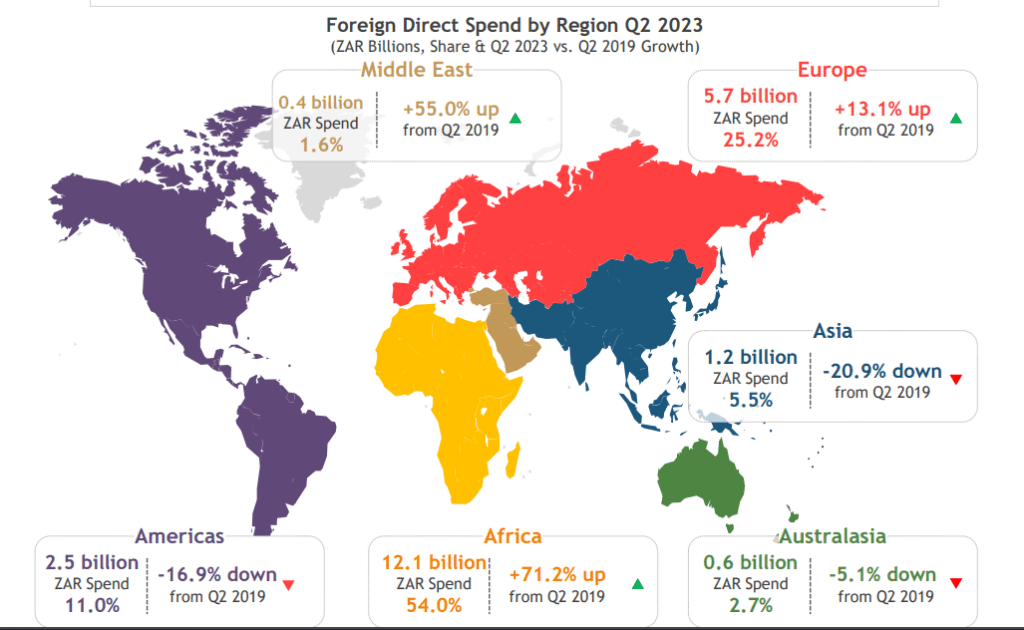Skift Take
'Africa for Africa' might sound cliche, but industry stakeholders think its potential as a tourism strategy has yet to be fully tapped.
Africa’s long-term travel prospects hinge on its domestic demand, a trend accelerated by the pandemic and an opportunity for the continent’s tourism-rich countries.
“Africa for Africa is vital,” said Anita Mendiratta, special advisor to the UNWTO Secretary General, who spoke to Skift at the Airbnb Africa Summit in Johannesburg.
“Domestic tourism was always the poor cousin of tourism. If you couldn’t afford to travel overseas, you stayed at home. Now, the value of domestic tourism has remained,” Mendiratta said.
For example, domestic tourism in South Africa climbed by 31% in overnight trips during the first four months of 2023 from a year earlier. Domestic travel spending during this period rose by 41%, according to South Africa’s Tourism Department data.
An Airbnb Economic Impact study detailing bookings for 2022 showed domestic stays in the country had increased by 34%, with seven of the 10 fastest-growing places visited outside of South Africa’s main tourist areas in the Western Cape and Gauteng.

Source: South African Tourism Performance Report | April-June 2023
While the World Travel & Tourism Council forecast the tourism sector could contribute 7% to the continent’s GDP in the next decade, challenges remain. This is despite the recently introduced African Continental Free Trade Area, the world’s largest by participant count, anticipated to ease trade and services across the continent.
High travel costs and poor transportation networks within and between countries make planning a trip harder than in other, more developed destinations. Mendiratta called the continent’s visa issues between countries a costly barrier.
WTTC pre-pandemic data also showed that domestic tourism accounted for 55% of spending in Africa, compared to 83% in North America and 64% in Europe, pre-pandemic.
Africa’s Middle Class Could Drive Growth
Yet, analysts suggest Africa’s expanding middle class could have domestic and regional tourism potential. The World Bank estimated a pre-pandemic middle class of 170 million people spread across the continent and its diverse economies, including Kenya, Egypt, Morocco, and Nigeria.
The African Development Bank sees one-third of the continent’s population as middle class based on a $2-20 daily spending, unlike data firm Fraym, which identified a “consumer class” of 330 million by analyzing ownership and education.
The continent has the youngest population in the world, with more than 60% of Africans under 25, which further presents a potential travel segment worth nurturing.
Gaps in Compelling Local Experiences
Developing unique travel products for African destinations that highlight the continent’s diverse offerings is essential, according to Jerry Mabena, CEO of Motsamayi Tourism.
While African destinations may share common attractions like the Big Five, each has unique cultural and historical aspects inherently tied to the local people and their heritage, said Mabena.
“In South Africa, there’s a sense that people come to the hotel, then they decide what to do, and actually it’s the other way around,” said Mabena. “Modern travelers are looking for immersion. And if you’re going to get immersed in a particular experience, whatever that experience is, it needs to be curated in a manner that draws you in. If it’s archeology, then it needs to be curated in a manner that’s non-academic.”
Mabena, for example, felt the Ndebele artwork of internationally acclaimed South African artist Ester Mahlangu needed to be showcased in a manner that rooted her talent in her hometown.
“Ester has a center in Nkangala, which should become a tourism destination,” said Mabena. “Ethiopia has some really beautiful religious sites, but I don’t think they are elevated that much. Even as an African, I know them because I’m in the sector. But if I wasn’t, I wouldn’t know about the ruins in Zimbabwe. So there’s a need for us to start finding an African story that needs to be then curated.”
Purpose-Driven Travel
There has been a forced reevaluation of what travel experiences mean on the continent, according to Mendiratta. She added that it is rooted in purpose-driven travel, further triggered by the pandemic, as travelers seek meaningful experiences rather than self-centered journeys.
“There is nowhere in the world that, at a cultural, social, and spiritual level, delivers [more] purpose-based travel than Africa. People come here to be unlocked,” said Mendiratta. “So they go home a different person. And that’s where Africa has always been the fastest track to people’s conscience and their hearts. That, to me, is the future of travel in Africa.”
The Daily Newsletter
Our daily coverage of the global travel industry. Written by editors and analysts from across Skift’s brands.
Have a confidential tip for Skift? Get in touch
Tags: africa, airbnb, ethiopia, experiences, south africa, tours and activities, unwto, wttc, zimbabwe
Photo credit: A view of Blyde River Canyon, in Hoedspruit, South Africa. Source: Unsplash Unsplash, Lina Loos. / Unsplash
